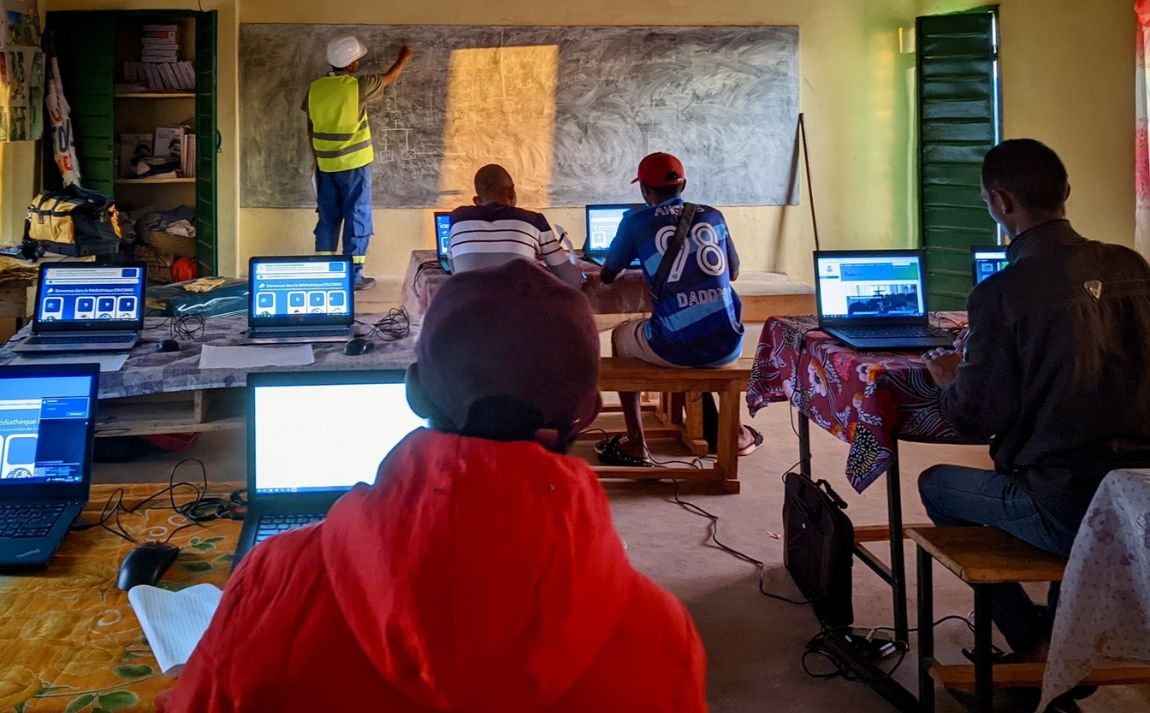- About
-
Projects
- Projects
-
Projects in Africa
- Overview
- Connecting off-grid girls to off-grid energy
- Regional hospital centre electricity project
- Installing photovoltaic systems and creating a MOOC for training
- Improvement of working conditions for women in Senegal
- Connection of the hospital centers of Beni
- Women Solar Academy
- Acteurs
- Solar energy for better health in Ivory Coast
- Rural entrepreneurship around innovative productive uses of electricity
-
Projects in Latin America
- Overview
- Provide solar photovoltaic systems to families living off-the-grid
- Provide accessibility for rural communities to a low-voltage electrical sytem
- Installation of solar panels for the Resilient Medical Centers
- Solar street lights installation in Bongaba
- Luz al Barrio
- Electrical Kits for houses
- Building safe community places
- Multi-regional project
- Partners
- Newsroom
- Call for Projects
- Contact us
Projects
Transforming education in Madagascar through sustainable initiatives
Sep 3, 2024
Teachers from remote high schools in Madagascar training in solar-powered equipment maintenance
In Madagascar, many high schools in remote areas face significant challenges, such as limited access to electricity and digital technology. To overcome these obstacles, ACCESMAD, a non-governmental organization dedicated to improving science and technical education, has partnered with the Fondation Nexans and other institutions to implement sustainable educational initiatives. Since 2016, this collaboration has aimed to improve access to quality education and promote sustainability in schools across the country. The current phase of the project, which runs from August 2023 to July 2027, aims to create lasting impacts that will benefit over 60,000 people.
Strengthening educational access in remote areas
At Fondation Nexans, we believe in the transformative power of education, which is why the Foundation supports projects that provide essential resources and long-term growth. One of ACCESMAD's primary initiatives, with the support of Fondation Nexans, is to equip high schools with computer labs and the necessary infrastructure. Initially, the focus was on upgrading electrical and network systems to facilitate the use of these new resources. Recognizing the unique challenges faced by schools not connected to the electricity grid, the project expanded to include solar-powered equipment. This innovative approach allows remote schools to access digital educational resources, regardless of their grid connection.
The partnership began in 2017 with the equipment of a first high school, and since then, an additional 12 remote high schools have benefited from similar upgrades. The type of equipment provided has also evolved. Initially, solar installations were primarily for teachers, but ACCESMAD has since adapted them for direct use by students, introducing solar-powered computers and "solar suitcases" - portable tablets that recharge using solar energy, ready for use in various classrooms.
Building capacity and ensuring sustainability
Developing local capacities to ensure the sustainability of educational resources is at the heart of the collaboration between ACCESMAD and Fondation Nexans. This involves transferring responsibilities for project management, equipment maintenance, and leadership to local photovoltaic groups. To facilitate this transition, ACCESMAD has launched training programs focused on maintaining computer and photovoltaic equipment, enabling schools to manage their own resources effectively and ensure the continued success of the project.
Furthermore, this partnership has led to the development of a training module focused on renewable energy, now officially included in the high school curriculum in Madagascar. This module, accessible in over 100 high schools, allows nearly 60,000 students to acquire valuable knowledge on this subject.
Innovative approaches and collaborative partnerships
The collaboration with ACCESMAD has fostered partnerships with technical institutions to strengthen schools' capacities in managing and maintaining their educational tools. The introduction of solar suitcases in six schools represents a significant advancement, improving both sustainability and environmental impact. Fondation Nexans has played a key role in providing the necessary cabling, equipment, and power supply to enable these developments.
Moreover, the project addresses environmental sustainability by implementing strategies for managing electronic waste, such as recycling old computers. This approach aligns with the broader goals of the initiative, aiming to promote sustainable development and environmental responsibility.
Impact on communities and future outlook
The initiatives supported by ACCESMAD and Fondation Nexans have had a significant impact on communities, particularly in remote regions of Madagascar. By providing access to quality education and fostering professional development for teachers, the project empowers young people, including girls, to pursue higher education in STEM fields (Science, Technology, Engineering, and Mathematics). This not only opens new opportunities for students but also contributes to the socio-economic development of their communities.
As the project continues until July 2027, ACCESMAD and Fondation Nexans remain committed to continuing their efforts to expand access to quality education, inspire innovation, and ensure the sustainability of resources. Their work is essential for creating a brighter and more sustainable future for the next generation in Madagascar.



